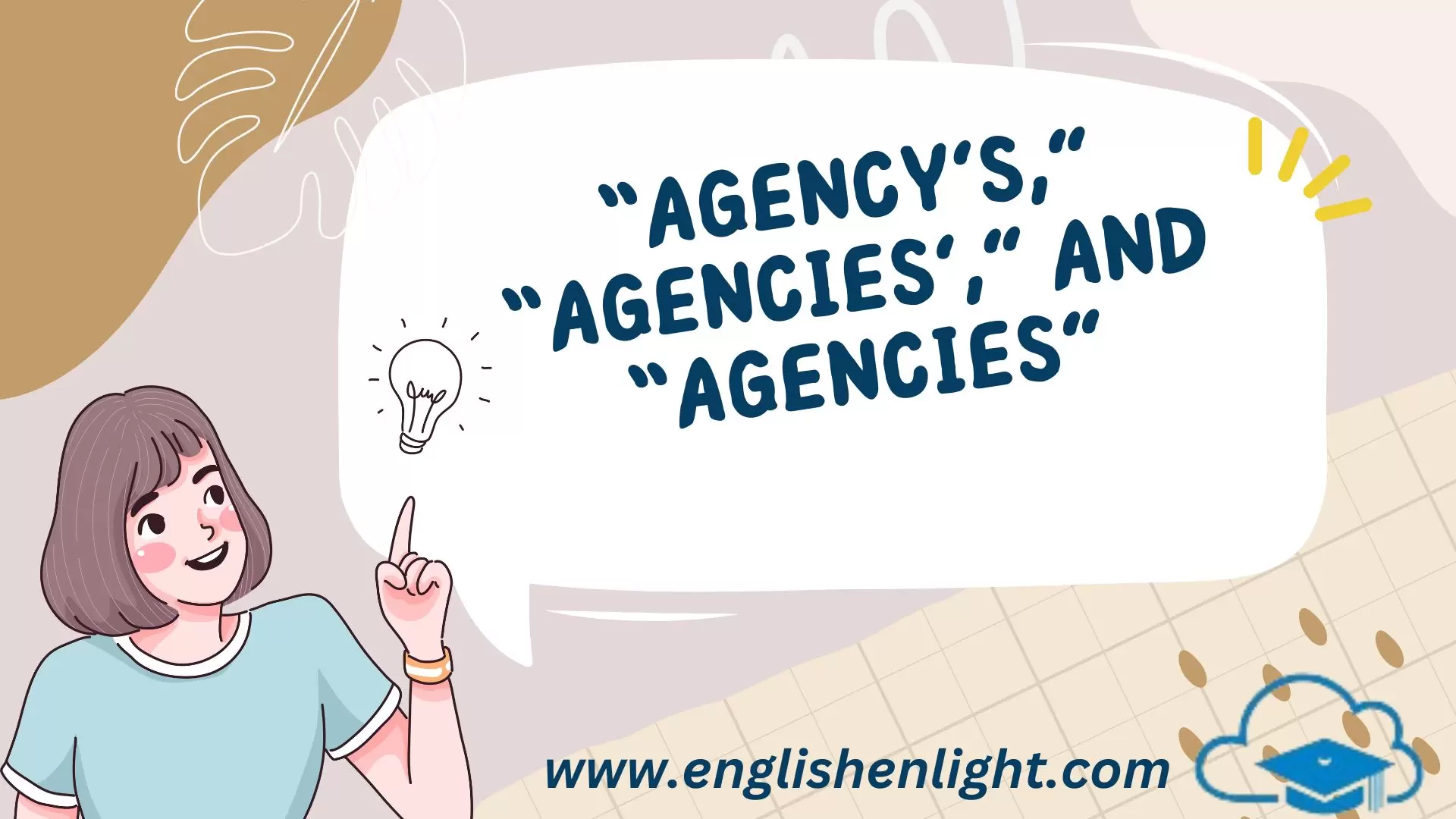Introduction
Highlighting the importance of considering context, exploring idiomatic expressions, and providing a comparative analysis enriches understanding and application of “agency’s,” “agencies’,” and “agencies” in English communication.
Understanding the nuances of grammar is essential for effective communication. One common source of confusion for English speakers is the use of “agency’s,” “agencies’,” and “agencies.”
These terms may seem similar, but they serve different purposes in the English language. In this article, we’ll delve into each form, providing explanations and examples to clarify their usage.
What Are We Talking About?
When discussing “agency’s,” “agencies’,” and “agencies,” we’re addressing the concept of possession and plurality in the English language. Each form represents a variation of the word “agency,” but with different grammatical functions.
Table of Forms
| Form | Function | Example |
| “Agency’s” | Possessive singular | The agency’s decision was final. |
| “Agencies’” | Possessive plural | The collaboration among the agencies’ representatives was evident. |
| “Agencies” | Plural without possession | Several agencies were involved in the project. |
The Different Forms

“Agency’s”
This form is the possessive singular of “agency.” It indicates that something belongs to or is associated with a single agency. For instance, if we say, “The agency’s decision was final,” we’re referring to a specific decision made by a particular agency.
“Agencies’”
In contrast, “agencies’” is the possessive plural form of “agency.” It denotes that something belongs to or is associated with multiple agencies. For example, “The agencies’ collaboration resulted in a successful outcome,” highlights the collective effort of multiple agencies.
“Agencies”
The term “agencies” functions as the plural form of “agency” without indicating possession. It simply refers to more than one agency without specifying ownership. An example sentence could be, “Several agencies were involved in the project.”
Read More:
Easy Tips to Remember
Distinguishing between these forms can be simplified by keeping a few key points in mind:
- Possession: When something belongs to a single agency, use “agency’s.” For multiple agencies, employ “agencies’.”
- Plurality: If you’re referring to more than one agency without indicating possession, use “agencies.”
Examples
- Possessive Singular:
- Example: The agency’s decision was applauded by stakeholders.
- Explanation: Here, “agency’s” indicates that the decision belongs to a specific agency.
- Possessive Plural:
- Example: The collaboration among the agencies’ representatives was evident.
- Explanation: In this instance, “agencies’” denotes that the representatives belong to multiple agencies.
Further Enhancements

Contextual Usage:
Highlighting the importance of considering the context when choosing between “agency’s,” “agencies’,” and “agencies” can further enhance understanding.
For instance, in legal documents or formal reports, precision in possessive forms may be crucial, whereas in casual conversations or creative writing, flexibility in plural forms might be more appropriate.
Idiomatic Expressions:
Exploring idiomatic expressions or common phrases that incorporate these forms can aid in memorization and practical application.
For example, phrases like “the agency’s role” or “the agencies’ perspectives” provide real-world examples of possessive and plural usage, respectively, in everyday language.
Comparative Analysis:
Providing a comparative analysis with similar constructs in other languages or historical variations within English can enrich the understanding of “agency’s,” “agencies’,” and “agencies.”
Exploring how possession and plurality are expressed in languages like Spanish or French, or how English grammar has evolved over time, offers valuable insights into the broader linguistic context.
Contextual Usage:
Highlighting the importance of considering the context when choosing between “agency’s,” “agencies’,” and “agencies” can further enhance understanding.
For instance, in legal documents or formal reports, precision in possessive forms may be crucial, whereas in casual conversations or creative writing, flexibility in plural forms might be more appropriate.
Idiomatic Expressions:
Exploring idiomatic expressions or common phrases that incorporate these forms can aid in memorization and practical application.
For example, phrases like “the agency’s role” or “the agencies’ perspectives” provide real-world examples of possessive and plural usage, respectively, in everyday language.
Comparative Analysis:
Providing a comparative analysis with similar constructs in other languages or historical variations within English can enrich the understanding of “agency’s,” “agencies’,” and “agencies.”
Exploring how possession and plurality are expressed in languages like Spanish or French, or how English grammar has evolved over time, offers valuable insights into the broader linguistic context.
Pros and Cons
| Pros | Cons |
| Clarity: Proper use of these forms enhances clarity in writing, ensuring that the reader understands the intended meaning. | Confusion: Incorrect usage can lead to confusion, especially in formal writing or professional communication. |
| Precision: By indicating possession or plurality accurately, writers can convey specific information without ambiguity. | Complexity: Learning and remembering the distinctions between these forms may require some effort, particularly for non-native English speakers. |
| Consistency: Consistently applying these forms throughout a piece of writing maintains coherence and professionalism. | Overemphasis: Overusing possessive forms like “agency’s” or “agencies’” can clutter sentences and detract from the main message. |
| Flexibility: Understanding these forms allows writers to adapt their language to different contexts and audiences effectively. | Misinterpretation: Misusing these forms can result in misinterpretation or misunderstanding, impacting the overall effectiveness of communication. |
Conclusion
Mastering the usage of “agency’s,” “agencies’,” and “agencies” contributes to effective communication in English. By understanding the differences between these forms and applying them correctly, writers can convey their ideas with precision and clarity.
Remembering the basic principles of possession and plurality simplifies the task, ensuring accurate usage in various contexts.

Hi, I’m Alexander, the admin of the website “English Enlight.” My job is to make sure everything runs smoothly on the site. I help users if they have any problems and make sure all the information is correct. It’s important to me that everyone enjoys using our website and learns something new about English every time they visit. If you need any help or have any questions, feel free to reach out to me!













